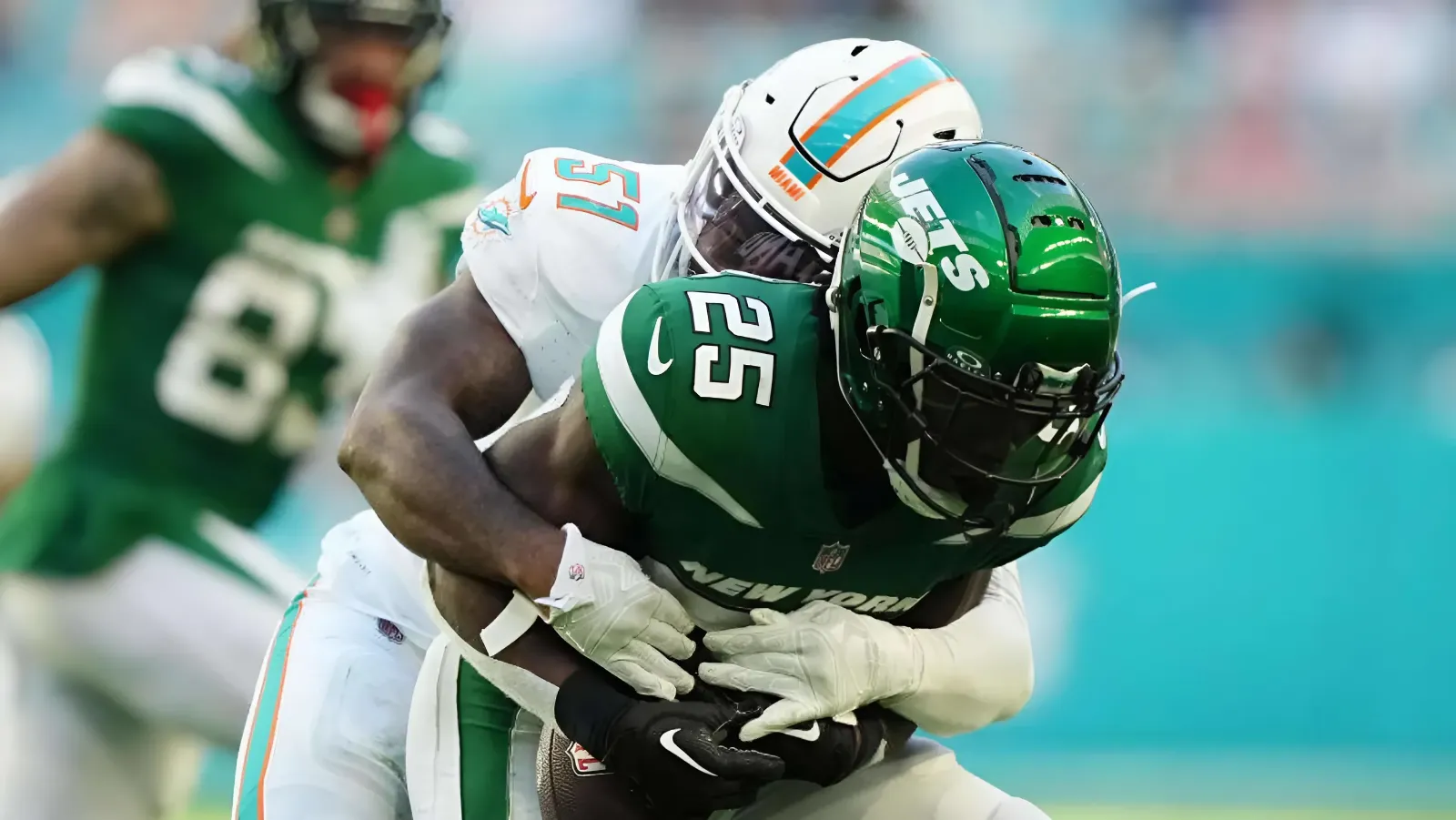The New York Jets traveled to Miami in Week 14 for a critical divisional matchup against the Dolphins. It was a must-win game for New York to keep their slim playoff hopes alive, as a loss would officially eliminate them for the 14th consecutive season. Unfortunately, the Jets fell short in overtime, losing 32-26 in a game that showcased offensive promise but ended in familiar disappointment.
The Jets’ defense struggled without star cornerback Sauce Gardner, as Miami quarterback Tua Tagovailoa took full advantage of the mismatch. Early in the game, Tagovailoa connected with Tyreek Hill and Jaylen Waddle on key throws, quickly exposing New York’s secondary. A pass interference call on D.J. Reed extended the Dolphins’ opening drive, setting up De’Von Achane for a two-yard rushing touchdown and an early lead.
Despite their defensive woes, the Jets’ offense showed significant improvement. Aaron Rodgers delivered his best performance in years, throwing for over 300 yards for the first time since 2021. New York’s opening drive was promising, with rookie backs Braelon Allen and Isaiah Davis stepping up in Breece Hall’s absence. However, the Jets’ red-zone struggles resurfaced as they settled for a field goal rather than a touchdown. Miami added another field goal before the Jets finally found the end zone when Davis rushed in from 17 yards out, giving New York a brief 10-9 lead.

Both offenses moved the ball with ease throughout the first half, as neither defense could consistently make stops. Miami regained the lead with two field goals before halftime, including a 57-yarder from Jason Sanders. Rodgers and the Jets’ offense remained aggressive, with Rodgers finding Davante Adams and Garrett Wilson for big plays. However, New York’s inability to capitalize in the red zone haunted them again, forcing another field goal to make it a narrow 15-13 Dolphins lead at the break.
The second half opened with the Jets regaining momentum. Rodgers connected with Wilson on a deep pass to set up Adams for a short touchdown, reclaiming the lead at 20-15. The Jets’ defense finally managed to slow Miami on their next possession, forcing a punt and giving New York a chance to extend their advantage. Rodgers and the offense moved the ball well but once again faltered in the red zone, settling for another field goal to make it 23-15.
As the fourth quarter began, the Jets held the lead and seemed poised to take control. However, their offense stalled at a critical moment when Rodgers was sacked on third down, leading to the team’s first punt of the game. Miami capitalized, with Tagovailoa driving the Dolphins downfield and converting a two-point play after a touchdown to tie the game at 23-23. The Jets’ poor clock management on their next drive left Miami with enough time to respond. Although Rodgers put the team in position for a go-ahead field goal, a costly sack and questionable play-calling prevented the Jets from draining the clock. Sanders’ ensuing kick tied the game, sending it to overtime.
In overtime, the Dolphins took control. Tagovailoa found tight end Jonnu Smith—who had no catches in regulation—for three crucial receptions, including the game-winning touchdown. The Jets’ defense had no answer as Miami marched effortlessly down the field to seal the victory. Rodgers and the offense, who had played well all day, never got a chance to respond, as Miami ended the game on their opening drive of overtime.
The loss was a microcosm of the Jets’ season: missed opportunities, poor late-game execution, and questionable coaching decisions. Rodgers and the offense showed flashes of what they could be, as Wilson and Adams dominated Miami’s secondary. However, repeated red-zone failures and bad clock management ultimately doomed the Jets. Defensively, while they struggled early, they did enough late to give New York a chance to win.
With this defeat, the Jets were officially eliminated from playoff contention, extending their NFL-worst postseason drought to 14 seasons. While Rodgers’ strong performance gave fans a glimpse of the offense’s potential, it also underscored how much better the team could have been with improved coaching and decision-making. Moving forward, the organization must address its leadership and ensure that the next head coach and general manager are capable of unlocking the team’s potential and breaking this endless cycle of disappointment.



